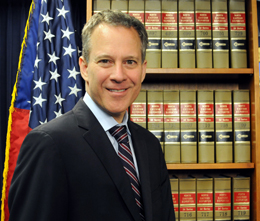NY AG: To allow state prosecutions of pardoned Trump aides, change double jeopardy
New York Attorney General Eric Schneiderman wants to change the state’s double jeopardy law to allow prosecutions if President Donald Trump issues "strategically timed" pardons to indicted aides or other individuals.
Schneiderman asked state lawmakers for a change to the “double jeopardy loophole” on Wednesday, report the New York Times, the New York Law Journal, the Atlantic and Politico. A press release is here, and the letter is here.
Schneiderman says in the letter that, under U.S. Supreme Court precedent, a federal prosecution is no bar to a subsequent state prosecution under the double jeopardy clause, and vice versa.
But additional protection added by the legislature to the state constitution’s double jeopardy clause—which is nearly identical to the federal clause—could stand in the way of a state prosecution after a pardon, Schneiderman wrote.
The state double jeopardy law generally provides that jeopardy attaches (meaning subsequent prosecutions for the same acts are barred) when a defendant pleads guilty, or when a jury is sworn in a defendant’s criminal trial.
That means the state law could be invoked if the president issues a pardon after a defendant pleads guilty to a federal crime or after the swearing in of jurors in a defendant’s federal criminal trial.
“Simply put,” Schneiderman writes, “a defendant pardoned by the president for a serious federal crime could be freed from all accountability under federal and state criminal law, even though the president has no authority under the U.S. Constitution to pardon state crimes.”
The state law has several exceptions, including when an appeals court vacates a conviction. Schneiderman proposes adding an additional exception.
The Times reports that passage of Schneiderman’s requested change “is hardly a forgone conclusion, given the narrow political divide in the state Senate.” If the change is enacted, anyone who is prosecuted after a pardon is likely to bring a court challenge, the article points out.
The Times spoke with Harvard law professor emeritus Alan Dershowitz about the proposal. He said the law’s constitutionality would depend on how it is drafted. One issue would be the “specificity of the statute” and whether its focus is on a limited number of people.
The problem, according to Oliver Koppell, a former New York attorney general, is that a narrowly drawn law could viewed as a bill of attainder. A broader one, however, could have unintended effects.
“I think hard cases make bad law, and I’m kind of skeptical about this,” he told the Atlantic.




